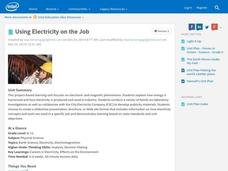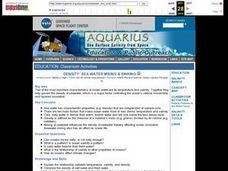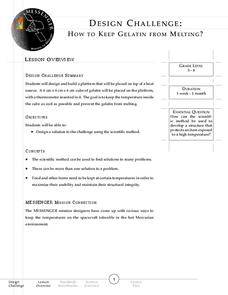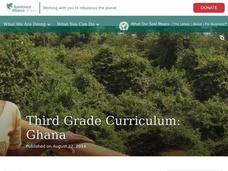Curated OER
Technology Integration Project Weather Unit Plan
High schoolers use a variety of technology-assisted weather observation tools to observe and record local weather. They identify, measure and record weather conditions, summarize types of clouds and make graphs of their observations....
Curated OER
Understanding Lava Layers
Seventh graders view "Volcano" by National Geographic Video. They experiment with baking soda and study lava flow. They describe volcano and earthquake patterns. They analyze weather and climate changes and how they relate to the natural...
Messenger Education
Look But Don’t Touch—Exploration with Remote Sensing
Mars is home to the tallest mountain in our solar system, Olympus Mons. For this set of two activities, learners review geologic land formations through the analysis of aerial maps. They then apply this knowledge to aerial maps of...
Intel
Using Electricity on the Job
Learners explore electricity, discussing its importance and researching different ways in which electricity can be generated. Groups present their findings to the class and then create publicity materials which promote and educate about...
California Academy of Science
Sustainable Water Solutions: Weighing the Pros and Cons
Switching indoor water fixtures to low flow reduces water usage by more than 45 percent. This and other solutions to reduce water usage have both pros and cons. Scholars view videos of different solutions, discuss them in small groups,...
Curated OER
Sea Water Mixing and Sinking
Students investigate the role of temperature and salinity in determining seawater density. They use a Temperature-Salinity Diagram to examine the effects of mixing on density.
Curated OER
Properties of Fresh and Sea Water
Students work with three stations to demonstrate the properties of water. They explore water's boiling point, freezing point, and its ability to store heat.
Curated OER
The Nature of Salt
High schoolers record information from the periodic table for sodium and chloride. They determine whether salts are molecular or ionic compounds, along with sodium chloride's molecular weight, and relative weights
Curated OER
Liquid Rainbow
Students develop their own techniques for drawing a small sample of solutions into a straw. They hypothesize ways to increase the density of water, and discuss how salt-free rainwater tends to float on top of salty seawater.
Curated OER
For the Birds
Second graders observe, identify, and document birds sighted at the library feeder station. They observe and document birds in order to begin their birder's life list. They apply scientific concepts and principles by using library...
Curated OER
Light and Elements
Here is a full-fledged investigation of light waves, the electromagnetic spectrum, and element spectra. Physicists research a scientist that contributed to our understanding of the behavior of light. They take notes on your lecture, and...
Curated OER
THE BACKWARD DESIGN PROCESS
Students explain the practical uses of robots. They interpret possible careers in robotics, apply the safety guidelines of robots, and develop a perspective of the use of robots. They empathize with the cultural issues of robots in work...
Curated OER
Community Action
Fifth graders decide how one uses resources within a particular bioregion. For this decision making lesson, 5th graders consider the biodiversity and complexity of the ecosystem. Students select a resource (water, paper, electricity)...
Rainforest Alliance
Who Takes Care of the Maya Forest Corridor?
Who keeps animals safe? Who keeps us safe? Discover the helpers that make learning and growing possible through a medley of activities that focus on habitats—ours and those in the rainforest. Scholars are asked to identify one helper who...
NOAA
Climographs
In the second lesson of a five-part series, young climatologists use provided temperature and precipitation data to create climographs of three different cities. They then analyze these climographs to develop a general understanding of...
Messenger Education
Design Challenge: How to Keep Gelatin from Melting
The inside of the spacecraft Messenger, which explores Mercury, will experience temperatures from 32 to 91 degrees Fahrenheit. In the final installment of a series of four space-related activities, groups spend time discussing and...
Visa
Rookie Lesson Module — Financial Football
Score a touchdown with an exciting game of financial football! Middle schoolers choose their favorite teams and play a virtual game of football as they answer various questions about economics.
Visa
Hall of Fame Lesson Module — Financial Football
Kick off an engaging review on personal finance with an online football game. Financial Football incorporates both football strategies and economic knowledge in an interactive format, allowing future CFOs to answer a variety of questions...
Cornell University
Polymerization
Explore condensation polymerization and additive polymerization through hands-on activities. Young scholars first model additive polymerization with paperclips. They finish the activity by using condensation polymerization to create a...
California Academy of Science
Exploring the Impacts of Feeding the World
Approximately 50 percent of people in the world who are chronically hungry work in agriculture. While it seems counter-intuitive, the farther you live from a farm, the more food options are available. Scholars explore concepts related to...
Curated OER
Surviving in Our Ecosystems
Third graders investigate the balance of ecosystems and how each species has different survival needs. They research on the internet using the site included. They then participate in activities/centers utilizing the facts they discovered.
Curated OER
Comparing Pulse Rates
Young scholars participate in a lab that demonstrate one example of how the human body maintains homeostasis. Students collect data from themselves and observe how their own bodies react to exercise.
Curated OER
Bringing Water to a Village in Lesotho
Students research water in Lesotho. In this water lesson, students watch videos showing how water comes to Lesotho Africa, they will compare this to how water is acquired in the US. Students will then create a mobile showing the...
Curated OER
The Long Road to Coffee
Students discover how coffee is processed from a plant, to a drink. In this life cycle lesson, students study that cells and organisms go through a cycle of growth and change. Students organize picture cards, illustrate how coffee is...

























